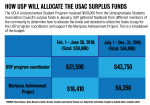The UCLA Undocumented Student Program plans to expand existing resources and create new services for undocumented students using money it received from the undergraduate student government’s surplus funds in January.
USP allocated $50,000 of the $100,000 it received from the Undergraduate Students Association Council to pay for its program coordinator position and continue supporting the Mariposa Achievement Project, said Paolo Velasco, director of the Bruin Resource Center.
The project offers a textbook lending library, meal vouchers and transportation subsidies for students who qualify for the program’s resources.
Velasco added USP plans to use half of the USAC allocation during the remainder of the 2017-2018 school year and the remaining funds during part of the 2018-2019 school year.
Since it received the allocation, USP sent out surveys to gather student input on how to distribute the funds and held a town hall in February, Velasco said.
Velasco said although many students have called on the program to provide need-based grants, university policies bar it from using student fees as a direct form of financial aid that prioritizes students because they are part of specific demographics, such as undocumented students. He added his office has been exploring ways to help the undocumented student community while following that rule.
For example, the program coordinator position and MAP were previously supported by University of California Office of President funds, but USP will now use USAC funds to support the programs, Valasco said.
Velasco added $40,000 of the UCOP funds will in turn provide direct financial support to students for the remainder of the school year.
UCOP funds follow different guidelines than USAC funds and can be used to provide one-time need-based grants to students.
Velasco added $10,000 of the UCOP funding will be used to create new mental health and career planning services.
USAC President Arielle Yael Mokhtarzadeh said it was difficult to figure out how the surplus funds could benefit all undocumented students regardless of their status. For example, she said undocumented students who do not have AB 540 or Deferred Action for Childhood Arrivals statuses do not have the same support as those who fall under those programs.
“The students wanted to find a way to invest the funding in resources that would be accessible to all (undocumented) students,” Mokhtarzadeh said.
AB 540 allows nonresident and undocumented students who attended school in California for at least three years to pay in-state tuition.
Former President Barack Obama created DACA in 2012 to defer deportation for undocumented individuals who were brought to the United States as children. Although President Donald Trump announced DACA’s end in September, the program continues to be active while courts review lawsuits against the Trump administration’s decision.
Dong Hyeon Kim, a first-year biochemistry student and an undocumented student, said he thinks the one-time need-based grants will help relieve prospective students of financial stress when making college decisions.
“Direct financial aid will be pretty good because a lot of the problems of undocumented students are making their college decisions,” he said. “We couldn’t apply to colleges that we knew wouldn’t give us much financial aid. We would be treated as international students and couldn’t fill out FAFSA.”

They are illegal aliens. Did the students get to vote on giving this money to illegal aliens?
This money should go to deserving students – not cheats and frauds who were smuggled into the United States by traffickers.